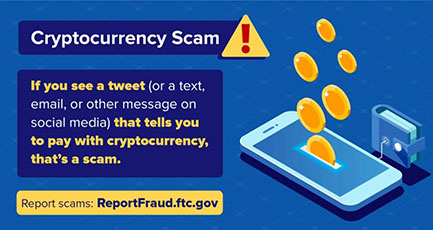Cryptocurrency Risks
Facts About Paying With Cryptocurrency
There are many ways that paying with cryptocurrency is different from paying with a credit card or other traditional payment methods.
- Cryptocurrency payments do not come with legal protections. Credit cards and debit cards have legal protections if something goes wrong. For example, if you need to dispute a purchase, your credit card company has a process to help you get your money back. Cryptocurrencies typically do not come with any such protections.
- Cryptocurrency payments typically are not reversible. Once you pay with cryptocurrency, you can usually only get your money back if the person you paid sends it back. Before you buy something with cryptocurrency, know the seller’s reputation, by doing some research before you pay.
- Some information about your transactions will likely be public. People talk about cryptocurrency transactions as anonymous. But the truth is not that simple. Cryptocurrency transactions will typically be recorded on a public ledger, called a “blockchain.” That’s a public list of every cryptocurrency transaction — both on the payment and receipt sides. Depending on the blockchain, the information added to the blockchain can include details like the transaction amount, as well as the sender’s and recipient’s wallet addresses. It’s sometimes possible to use transaction and wallet information to identify the people involved in a specific transaction. And when you buy something from a seller who collects other information about you, like a shipping address, that information can also be used to identify you later on.
Facts About Investing with Cryptocurrency
- Cryptocurrencies aren’t backed by a government or central bank. Unlike most traditional currencies, such as the U.S. dollar, the value of a cryptocurrency is not tied to promises by a government or a central bank.
- If you store your cryptocurrency online, you don’t have the same protections as a bank account. Holdings in online “wallets” are not insured by the government like U.S. bank deposits are.
- A cryptocurrency’s value can change constantly and dramatically. An investment that may be worth thousands of dollars today could be worth only hundreds tomorrow. If the value goes down, there’s no guarantee that it will rise again.
- Nothing about cryptocurrencies makes them a foolproof investment. Just like with any investment opportunity, there are no guarantees.
- No one can guarantee you’ll make money off your investment. Anyone who promises you a guaranteed return or profit is likely scamming you. Just because the cryptocurrency is well-known or has celebrities endorsing it doesn’t mean it’s a good investment.
- Not all cryptocurrencies or the companies behind them are the same. Before you decide to invest in a cryptocurrency, look into the claims the company is making. Do an internet search with the name of the company and the cryptocurrency with words like review, scam, or complaint. Look through several pages of search results.
Beware of Crypto Scams - A two-page, printable infographic that shows common cryptocurrency scams and tips to avoid them.
Protect Your Money and Avoid Investment Scams
Investments tied to cryptocurrencies and digital assets were cited by state securities regulators as a top threat to investors in 2025, according to the North American Securities Administrators Association (NASAA). Investors are urged to practice the following tips to identify and avoid investment scams:
- Anyone can be anyone on the Internet. Scammers are spoofing websites and using fake social media accounts to obscure their identities. Investors should always take steps to identify phony accounts by looking closely at content, analyzing dates of inception and considering the quality of engagement. To ensure investors do not accidently deal with an imposter firm, pay careful attention to domain names and learn more about how to protect your online accounts.
- Beware of fake client reviews. Scammers often reference or publish positive, yet bogus testimonials purportedly drafted by satisfied customers. These testimonials create the appearance the promoter is reliable – he or she has already earned significant profits in the past, and new investors can reap the same financial benefits as prior investors. In many cases, though, the reviews are drafted not by a satisfied customer but by the scammer. Learn how to protect yourself with NASAA’s Informed Investor Advisory on social media, online trading and investing,
- If it sounds too good to be true, it probably is. Bad actors often entice new investors by promising the payment of safe, lucrative, guaranteed returns over relatively short terms – sometimes measured in hours or days instead of months or years. These representations are often a red flag for fraud, as all investments carry some degree of risk, and the potential profits are typically correlated with the degree of risk. Learn more about the warning signs of investment fraud.
Investor Alerts:
Avoid Scams Involving Virtual Currency Kiosks or "Bitcoin ATMs"
Be Cautious of the Crypto Investment Craze
Financial Advice via Social Media: The Rise of the "Finfluencer"
What to Know About ICOs (Initial Coin Offerings)
For more information:
What To Know About Cryptocurrency and Scams (FTC)

